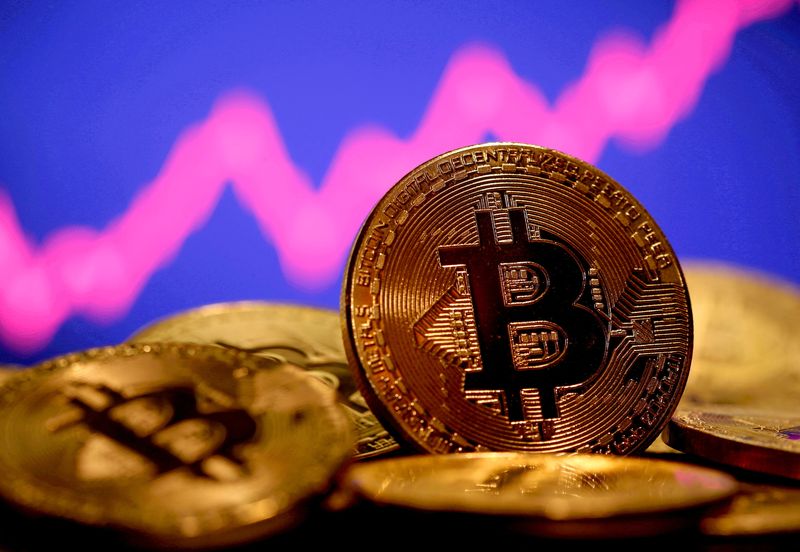By Medha Singh and Lisa Pauline Mattackal
(Reuters) - Big investors are dipping their toes into crypto waters again after a bumper month for bitcoin.
Digital asset investment products, often favored by institutional investors, saw inflows of over $117 million last week, the biggest weekly increase since last July, according to data from asset manager CoinShares.
Bitcoin was far and away the biggest draw, with funds tracking it responsible for $116 million of that. Crypto funds' total assets under management have risen to $28 billion, up 43% from lows plumbed in November as the collapse of the FTX exchange sent shockwaves through the industry.
"For the most part, people are more confident than they were a month ago," said Joseph Edwards, investment adviser at Enigma Securities.
Bitcoin, the original cryptocurrency, has soared nearly 40% in January, closing in on its best monthly performance since October 2021 and its second-best January in the past 10 years.
The rally, combined with a possibly brightening macro picture, has some investors hoping the long crypto winter might finally be verging on spring. Many investors expect the U.S. Federal Reserve to hike its benchmark rates by 0.25% this week - the smallest rise since their tightening cycle began last year.
"If peak inflation is indeed behind us for now, then long-term interest rates may move lower as we approach the end of the inflation-focused rate-hiking cycle," analysts at Fidelity Digital Assets wrote.
"This could signal positive momentum on the macro front for assets such as bitcoin."
Activity in the options market indicated traders were rushing to place bets just after the Fed meet, a sign of the importance the market is placing on it, crypto liquidity provider B2C2 said.
Crypto trading volumes are also rising, according to CoinShares, with average weekly volumes up 11%, indicating traders are returning after months of dampened activity.
Still, crypto's not out of the woods by a long stretch, and the Fed could still spoil the party if they take a more hawkish tone this week.
Crypto data platform Coinglass's bitcoin Fear & Greed index - where 0 indicates extreme fear and 100 extreme greed - is hovering at 61, the highest level since mid-November 2021, just after bitcoin began retreating from its peak.
"We might see a drop off next week or two, how deep that drop goes is questionable," Edwards said.
Graphic: Bitcoin at the forefront https://www.reuters.com/graphics/FINTECH-CRYPTO/WEEKLY/akveqmgjrvr/chart.png
BITCOIN 'DOMINANCE'
Nonetheless, there are also other signs that the end of the bear market might be nigh, according to analysts at exchange Bitfinex. They said shorter-term investors were selling their bitcoin at a profit, while longer-term "HODlers" were still sticking with their coin and not contributing to selling pressure.
"The realised profit and loss for the entire market has been recorded as positive in January 2023 for the first time since April 2022, a continuation of this trend would signal the final stages of a bear market," they said.
Additionally, bitcoin's "dominance" or share of the total crypto market has hovered around 41% this month, levels not seen since last July. Analysts at Citi said this mimicked a similar jump in bitcoin dominance in April 2019, when a bitcoin rally marked a crypto market bottom.
Other market watchers said stocks, another relatively risky asset class, would likely drive bitcoin prices in the next week, particularly the performance of interest rate-sensitive tech stocks.
Bitcoin's correlation with the Nasdaq is at 0.94, the highest since May 2022, where a measure of 1 indicates the two are moving in lock-step.

Late in November, bitcoin broke its bonds with stocks and traded with a negative correlation of 0.7.
"It's possible that bitcoin could reach the next resistance level of $25,200 in the coming weeks," said Rachel Lin, CEO of exchange Synfutures. "Even if bitcoin ends up down again, there is a decent chance it will achieve a higher low on the larger timeframe."